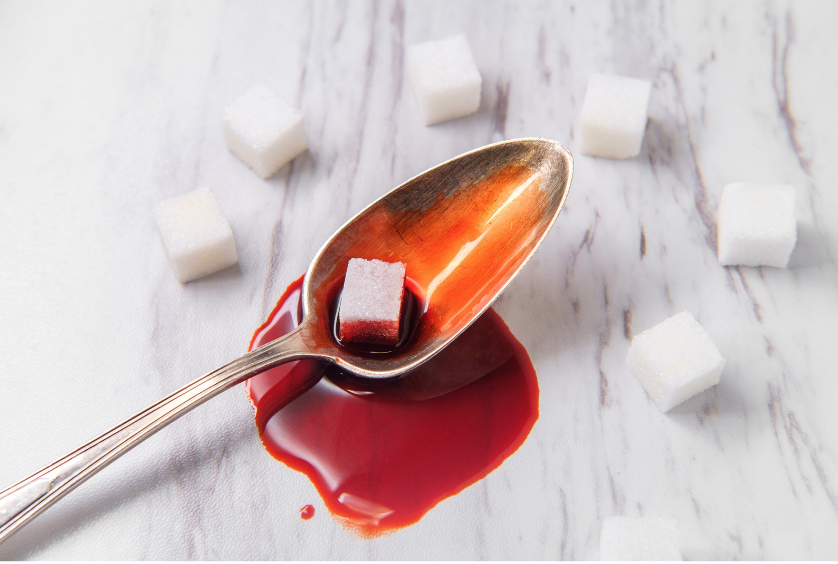Weight Loss Block #8: Blood Sugar

Did you know that people who have blood sugar issues, find it more difficult to maintain their ideal body weight, even if they eat healthy?
Is trouble with your blood sugar blocking your weight loss?
Weight loss is not always as simple as 'eat less & move more'.
There are 8 physiological blocks to weight loss that have nothing at all to do with calories or exercise.
The final of the 8 blocks is blood sugar issues.
Let's take a sneak peek at 12 ways that blood sugar imbalances can block weight loss:
1 - Sugar Is Converted to Fat - If one eats more sugar than is needed, it is converted to fat. That doesn't just mean white sugar and white flour, it also applies to natural complex carbohydrates as well - because they break down into simple sugars once they are digested. These sugars trigger the release of the hormone insulin which is a 'building' and 'storing' hormone. In general, the more often your insulin levels are stimulated and high, the more energy you store energy as fat.
2 - The SAD diet (standard north american diet) - The typical foods in this diet, displace quality protein and it's natural fat content, with processed carbs and factory farmed meat cooked in vegetable oils. This sets the stage for nutrition deficiencies and imbalanced blood sugar, because satiating healthy protein and fat, that would normally be central in a balanced meal, is displaced by carbohydrates.
3 - Low Blood Sugar - When we eat a 'sugary' foods, there ends up being an excess of sugar in the blood, which triggers the hormone insulin (to take the sugar out of the blood and put it in the cells). Unfortunately, the insulin can "overshoot" and cause low blood sugar. This is corrected in the short term by consuming more sugar (to bring the blood sugar back up). While the person feels better almost immediately, eating more sugar serves to perpetuate continuously fluctuating blood sugar.
4 - Hypoglycemia - Consistently eating food that quickly raises blood sugar (spikes), and thus also causing dramatic low blood sugar (slumps) results in hypoglycemia. A person with balanced blood sugar, can skip a meal with no side effects and no sensation other than hunger and a growling stomach. A person with imbalanced blood sugar can't do this. They will have all sorts of side effects - from feeling irritated or even angry if someone (or something) gets between them and their food - to having shakes, sweating, lightheadedness and irregular heartbeat etc. The need to eat NOW, causes poor food choices, because for a person with low blood sugar, food in that moment HAS to be something that is already, ready. There is no time to cook or prepare something.
5 - Excessive Hunger - Other side effects of hypoglycemia are excessive hunger, with decreased satiety. This causes the person to feel like they 'have to' constantly graze or snack in between meals. Thus excess food is consumed, driven by the need to stabilize blood sugar.
6 - Stimulant Foods - Since low blood sugar results in fatigue, this in turn causes cravings for stimulating foods like sweet treats, sugar, coffee, chocolate etc., which of course, only perpetuates more blood sugar issues and cravings.
7 - Carb Storage Is Overfilled - If you consume more sugar (carbs) than your liver and muscles can store (for later as glycogen), plus more than necessary for basic physiological processes, matched by your activity level, then the body has no choice but to store it as fat. It doesn't matter if the carb is a complex carb - natural or processed - it doesn't matter.
8 - Inflammation - Insulin's jobs is to move excess sugar out of the blood stream, where it would otherwise be inflammatory to your organs and cells. However, chronically elevated insulin, is itself also inflammatory. So even if it is doing it's job properly, one can have few to no symptoms of blood sugar instability and still be triggering inflammation, by constantly driving up insulin. Inflammation drives weight loss resistance as well.
9 - Feeling Snacks Are A Need, Not A Want - Insulin is constantly driven up by simply eating too much, eating the wrong things (certain foods trigger insulin more than others) or by eating too often (grazing or constantly feeling the need for treats or snacks). Remember, people in hypoglycemic states will feel tired and irritable if they don't snack. When they snack they feel better, and thus, they assume that snacking is what their body needs. All the while, it's exactly what their body doesn't need - and is only perpetuating blood sugar issues.
10 - Chronically high insulin levels eventually results in the loss of insulin sensitivity. This leads to elevated glucose in the blood and diseases of insulin resistance, such as diabetes, fatty liver, heart disease etc. The cells are essentially resistant to insulin, because they are already overstuffed with glucose and therefore the cell "doors" won't open.
11 - All of the above is a chronic stress on the body leading to excess cortisol, which triggers even more insulin and fat storage - all of which can happen without even eating an extra calorie. Just ask anyone who's tried extended fasting in a high state of stress and barely lost a pound, if any.
12 - Finally, when your insulin is out of balance, it sets off a domino effect creating imbalances in the other hormones as well, only adding to the weight loss resistance.
Would you like to balance your blood sugar and at the same time unblock your weight loss resistance?
Click here to learn more.
When you put your health first, the extra weight comes off naturally - as a good side effect of having achieved optimal health!
Blood sugar issues are just one example of the '8 Weight Loss Blocks' that we identify to individualize your weight loss journey.
Categories
- Mindset (62)
- Restaurant Reviews (1)
- Skinny Bombs (9)
- Skinny Desserts (7)
- Cleansing for Weight Loss (20)
- Become Certified (11)
- Appetizers (1)
- Weight Loss Blocks (physiological) (14)
- Breakfast (7)
- Case Studies (1)
- Snacks (1)
- Eliminate Excuses (2)
- Medical Weight Loss (1)
- Testimonials (5)
- Weight Loss Physiology (7)
- Weight Wisdom (14)
- Videos (1)
- Recipes (23)
- Group Coaching (1)
- Chocolate (9)
- Chocolate (1)
- metaphysical (1)
- emotional weight (3)
- Emotional Eating (2)
- Cookies (1)
- Condiments (1)
- Sauces, Dressings & Syrups (1)

0 comments
Leave a comment